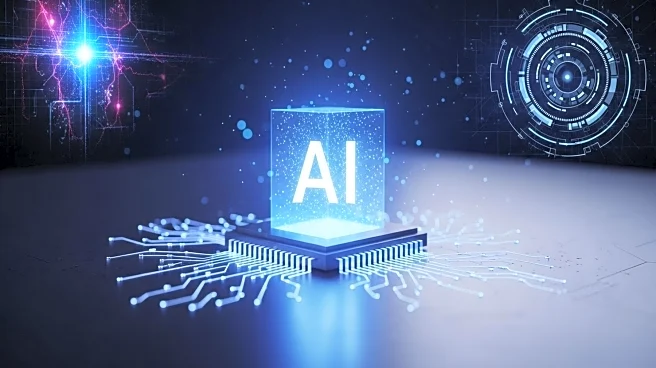What's Happening?
The AI in Workforce 4.0 market is anticipated to grow significantly, reaching USD 33.2 billion by 2033, according to Research Intelo. This growth is driven by the increasing integration of artificial intelligence across various aspects of workforce management, including recruitment and employee engagement. The market, which was valued at USD 6.8 billion in 2024, is expected to expand at a compound annual growth rate (CAGR) of 19.7% from 2025 to 2033. The rise of Workforce 4.0, characterized by automation, digitalization, and smart systems, is central to this transformation. AI is playing a crucial role in modernizing workforces, enhancing productivity, reducing operational costs, and enabling data-driven decision-making.
Why It's Important?
The expansion of AI in Workforce 4.0 is significant for several reasons. It addresses rising labor costs and skill shortages by providing AI solutions that maintain productivity without relying solely on human labor. Businesses are increasingly seeking operational efficiency, and AI-driven solutions help automate complex workflows, reduce waste, and improve supply chain visibility. Additionally, advancements in cloud computing and IoT facilitate the implementation of scalable AI solutions. However, challenges such as high implementation costs, data privacy concerns, and workforce resistance to change remain. Overcoming these hurdles is crucial for the successful adoption of AI technologies.
What's Next?
The future of the AI in Workforce 4.0 market looks promising, with a forecasted CAGR exceeding 20% over the next decade. Emerging trends include the integration of explainable AI to improve transparency, AI-powered collaborative robots working alongside humans, and augmented reality interfaces enhancing worker-machine interaction. AI is expected to evolve from supporting roles to becoming strategic partners in decision-making and predictive planning. As businesses continue to collect operational data, the AI ecosystem will mature, enabling smarter workflows and efficient workforce management.
Beyond the Headlines
The adoption of AI in Workforce 4.0 also raises ethical and cultural considerations. Companies must address workforce apprehension about job displacement and mistrust of automated systems. Implementing change management and upskilling programs is essential to alleviate these concerns. Additionally, establishing secure and compliant AI solutions is a top priority to mitigate data privacy and security risks. As AI becomes more integrated into workforce management, it is crucial to ensure that these technologies are used responsibly and ethically.









